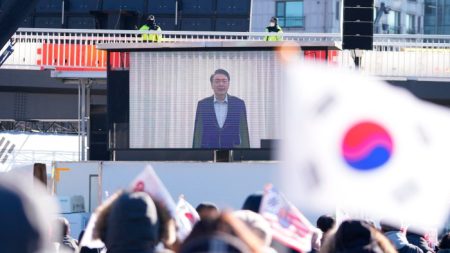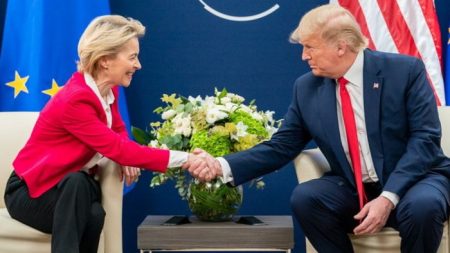Unlock the Editor’s Digest for free
Roula Khalaf, Editor of the FT, selects her favourite stories in this weekly newsletter.
Far-right ministers in Israel piled pressure on Benjamin Netanyahu to spurn a broader hostage-for-prisoner release deal with Hamas, even as talks continued over extending the temporary truce in Israel’s war against the Palestinian militant group.
Two of the Israeli prime minister’s cabinet ramped up attacks on the ceasefire, warning that his coalition government was under threat if he pursued a more ambitious swap with Hamas.
The threats came as the militant group on Wednesday handed over two hostages with Israeli-Russian citizenship, with the expectation it would also release another 10 women and children who have been held in Gaza. In return Israel would free a further 30 Palestinians from Israeli prisons.
Mediators in Qatar were also on Wednesday working to extend the existing truce — due to expire on Thursday morning — by 48 hours. But claims from Hamas that the youngest hostage, a 10-month-old baby, and two other members of his family had been killed in captivity cast a shadow over the discussions.
The current truce agreement, which took effect last Friday, has the potential to be extended to 10 days. But there have also been discussions about a broader deal that would probably require Israel to commit to a more lasting halt to its offensive and to release large numbers of Palestinian prisoners, including those convicted of murder.
In return, Hamas and other militant groups would release more hostages from Gaza, potentially including the dozens of Israeli soldiers being held in the strip.
But Netanyahu said on Wednesday that Israel would resume its military campaign “after completing this stage of the return of our hostages”, adding: “There is no situation in which we do not go back to fighting until the end.”
Netanyahu faces domestic and international pressure, particularly from hostage families, to extend the truce to secure the release of all the civilians and soldiers Hamas seized during its October 7 attack on Israel.
US secretary of state Antony Blinken is scheduled to return to Israel on Thursday, where he is expected to push for a continuation of the pauses in the hostilities to facilitate the release of more hostages and allow more aid into Gaza.
But Netanyahu, who has vowed to destroy Hamas, also faces public resistance from far-right members of is government to any further deals with the militant group.
Bezalel Smotrich, Israel’s finance minister, warned that broadening the current agreement was “not on the agenda, not even as a suggestion”. “This is a plan to eliminate the State of Israel,” he added on social media platform X. Itamar Ben-Gvir, Israel’s national security minister, wrote: “Stopping the war = dissolution of the government.”
Far-right members of Netanyahu’s coalition have been particularly opposed to the release of any Palestinian prisoners beyond women and children as part of any deals with Hamas.
The far-right politicians were part of the government before the outbreak of war, but their leverage was diluted with the formation of an “emergency unity” government after October 7.
Yet analysts say Netanyahu would be reluctant to break with his traditional political allies as he aimed to retain power in future.
A senior Israeli official said the government was focused on freeing the remaining civilian women and children held in Gaza, an aim that would require an extension of the current hostage-for-prisoner deal.
“The original agreement was about women and children. We need 27 more . . . we’re not discussing anything else,” the person said. “We’re not going to abandon 27 people to discuss a new agreement.”
The initial deal called for the release of 50 Israeli women and children seized by the militant group during its devastating cross-border assault in which Israeli authorities say at least 1,200 people were killed.
Israel in return committed to free 150 Palestinian women and children jailed for various security offences from its prisons, and to allow entry of increased amounts of aid into besieged Gaza.
The agreement was subsequently extended for two days, with an additional 10 Israeli hostages and 30 Palestinian prisoners released late on Tuesday.
More than 150 Israelis and foreign nationals out of the estimated 240 seized on October 7 are believed to still be held in Gaza by Hamas and other smaller militant groups. Relatives of Israeli hostages have campaigned publicly for the Netanyahu government to “pay any price” to return their loved ones.
Hamas on Wednesday said in a statement that three Israeli hostages from the Bibas family — including 10-month-old Kfir, his four-year-old brother Ariel, and their mother Shir — had been killed in previous Israeli air strikes.
No evidence was provided, and recent reports had indicated the family was in the hands of a smaller militant faction in Gaza.
The Israeli military said in a statement that it was “assessing the accuracy of the information” and that its representatives were in contact with the family.
The Bibas children had become symbols of the movement to secure the release of all the hostages.
The war, now in its eighth week, has reduced swaths of densely populated Gaza to rubble and claimed the lives of 14,800 Palestinians, according to health authorities in the Hamas-controlled enclave.
Read the full article here












